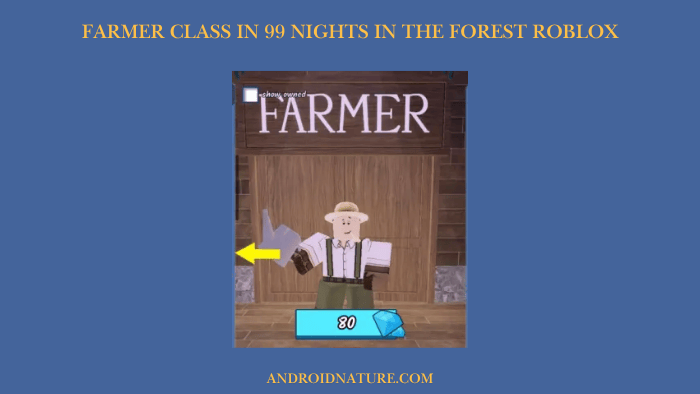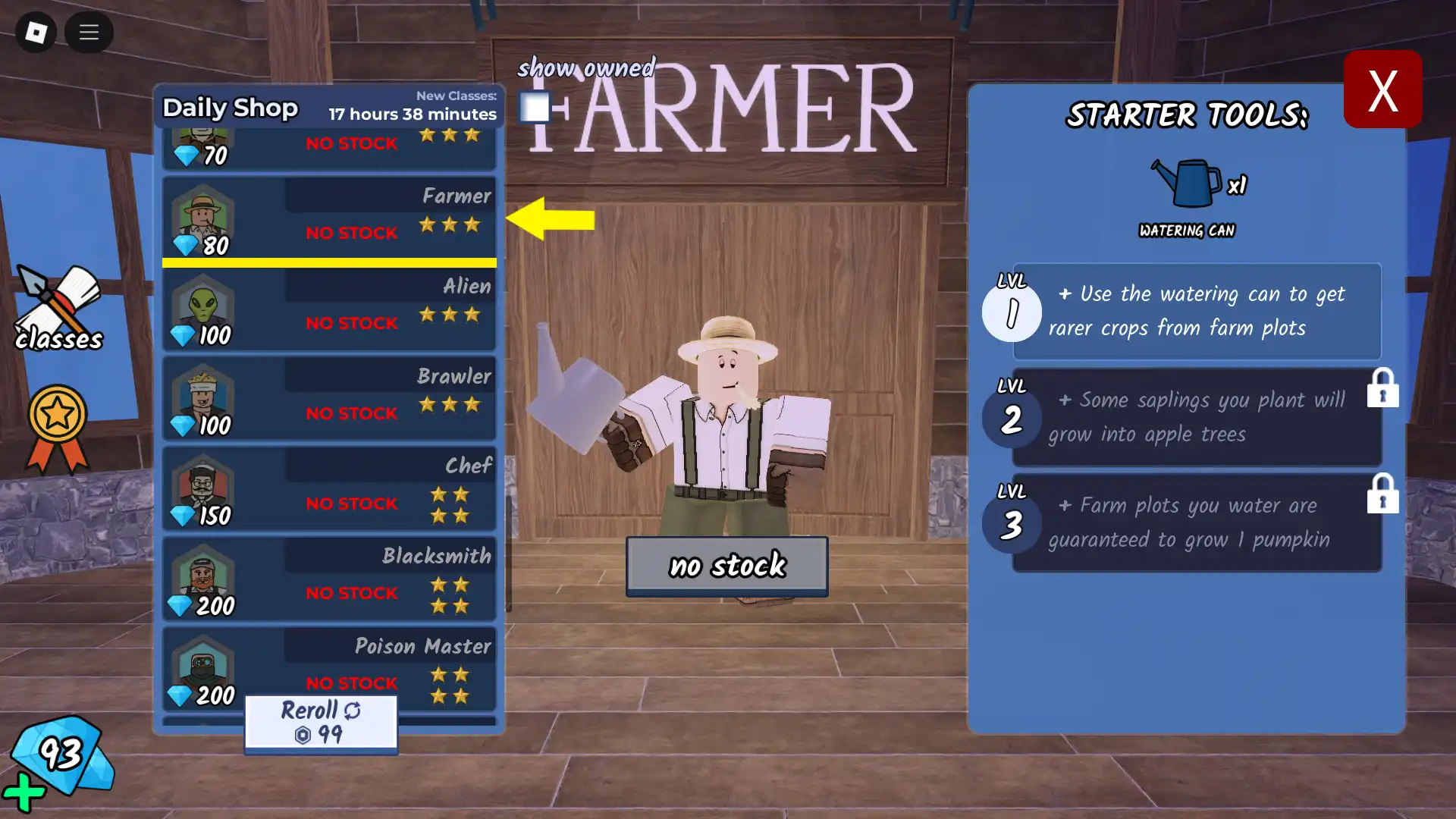The Farmer Class in 99 Nights in the Forest is the backbone of your camp’s sustainability.
While many players rush for combat or exploration classes, the Farmer ensures everyone stays fed and supplied.
It’s not the flashiest role, but in long survival runs, this class can make all the difference, turning basic farming into an essential part of your strategy.
If you’re the type of player who enjoys slow but steady progress and supporting your team with valuable crops, the Farmer class is perfect for you.
Farmer Class in 99 Nights in the Forest: Overview
The Farmer Class can be unlocked for 70 Gems and comes equipped with a Watering Can, making it immediately useful for crop cultivation.
While the Farmer doesn’t specialize in combat or exploration, it’s one of the best utility classes for producing food, rare plants, and other valuable materials used in crafting and trading.
The Farmer’s perks directly affect your crops — from increasing rarity chances to guaranteeing specific plants, which means you’ll always have a stable food supply and trade resources.
Farmer Class Perks
| Level | Perk | Effect |
|---|---|---|
| Level 1 | Rare Crop Chance | Using the watering can increases your chances of growing rare crops from farm plots. |
| Level 2 | Apple Tree Growth | Some saplings you plant will grow into apple trees, offering consistent food over time. |
| Level 3 | Guaranteed Pumpkin | Farm plots you water will always yield at least one pumpkin, one of the most valuable crops for survival. |
These perks make the Farmer ideal for long-term progression. From early sustenance to advanced food production, your harvests can sustain an entire group through multiple nights — or be traded for rare resources.
How to Use the Farmer Class Effectively
-
Focus on Early Farming: Start planting crops as soon as possible. Even basic ones provide good returns early in the game.
-
Water Regularly: The Farmer’s watering can boosts rare crop chances, so consistent watering is key. Make a loop around your plots every few minutes to maximize growth.
-
Plant in Safe Areas: Keep your farm close to your base or within protected zones to prevent enemy raids.
-
Sell Surplus Crops: Trade excess food for materials or items you need — especially if you’re playing in multiplayer servers.
-
Upgrade Your Plots: As you gather resources, expand your farming area and use your apple tree perk for renewable food.
Pros of the Farmer Class
-
Best for long-term survival and sustainability
-
Provides a renewable food source
-
Supports team-based strategies
-
Guaranteed pumpkins and rare crops at higher levels
-
Great synergy with Cook or Chef classes
Cons of the Farmer Class
-
Lacks combat perks or defenses
-
Slow early-game progression
-
Farming requires time and patience
-
Limited usefulness in fast-paced solo play
Is the Farmer Class Worth It?
Yes — but it depends on how you play. The Farmer Class shines in multiplayer sessions or long survival runs where resource management and team coordination matter.
It’s the perfect pick for support players who like ensuring their group always has food and tradeable crops.
For solo players or speedrunners, though, it can feel slow and passive. The rewards come gradually, but once your crops start producing rare food and pumpkins consistently, the payoff is huge.
Trivia
-
The Farmer Class synergizes perfectly with the Cook and Chef classes, since they can use the Farmer’s produce for advanced recipes.
-
Pumpkins from the Level 3 perk provide one of the best hunger refills in the game.
-
Some rare crops grown by Farmers can trigger hidden recipes not available through normal play.
Final Words
The Farmer Class in 99 Nights in the Forest is the quiet hero of the survival world. While others fight or explore, you’ll be ensuring everyone lives another day with full bellies and strong supplies.
It’s a relaxing yet rewarding class, perfect for players who enjoy strategy, planning, and contributing to their team’s long-term success.
Whether you’re growing apples or harvesting pumpkins, the Farmer keeps the forest alive and thriving.

Ankit is an engineer by profession and blogger by passion. He is passionate to do all the stuff such as designing the website, doing the SEO, researching for the content, writing tech blog posts and more.








